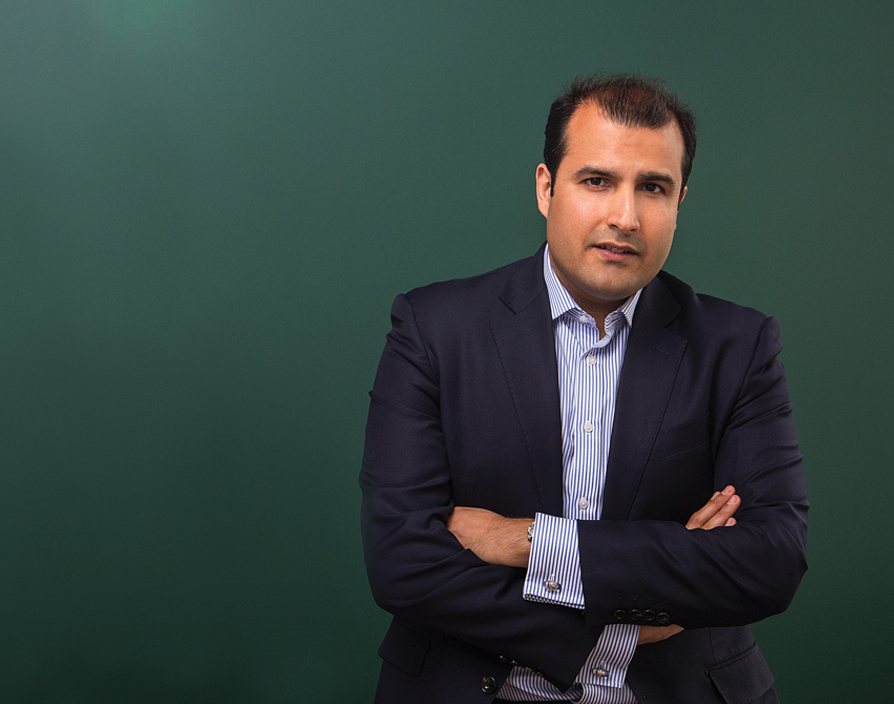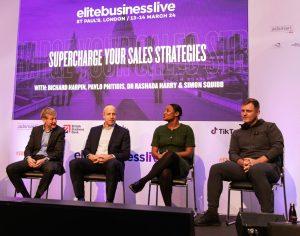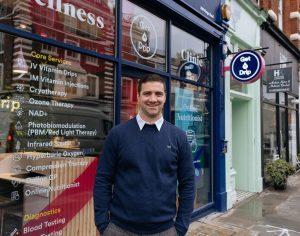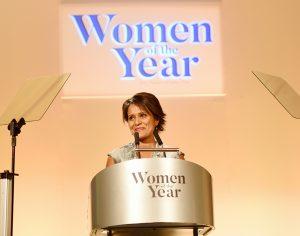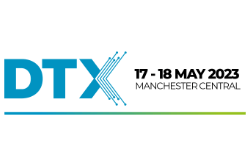The first emergency calls were recorded seven minutes after ten o’clock on June 2017. The callers reported how their Saturday night had turned into a nightmare when a van suddenly mounted the curb on London Bridge, ramming into several pedestrians. When it came to a stop, three men exited and began to attack everyone in sight with 12-inch long ceramic knives. An eyewitness remembers screaming: “Run, run, run, they’re stabbing everyone.”
Less than ten minutes after the first alarm, the attack ended when police arrived at the scene, shooting the assailants. By then, they’d already killed eight victims and injured 48 others. That’s when Vishal Marria offered to help the authorities by providing them with Quantexa’s services. “The London Bridge attack itself was very personal to me because it was right outside our previous office when we were in Borough High Street,” he remembers. At the time, his startup had barely been up and running for a year. Still, it had already proved itself by using its technology to help companies like HSBC prevent financial crimes by providing a huge contextual overlook of not just a single individual’s finances but also the people connected to that person. Now, the co-founder and CEO of the business believed the same software could help the authorities get a better understanding regarding the three terrorists. The tech allowed the investigation to get a better idea of who the men in the van had transacted, shared addresses and contact information with. “That’s really powerful,” Marria explains. “When you know that this person is bad, knowing that all these other people are involved and that you should be talking to these people immediately, that’s powerful.” While he’s conscious about not revealing too much of the investigation, the aftermath of the London Bridge attack shows what Quantexa is capable of.
No wonder the scaleup has had numerous successes since launching in March 2016. It has already raised $23.3m across two rounds, set up international offices in America, Asia and Australia, partnered up with heavy hitters like Shell and used its technology to interpret big data sets to prevent numerous complex financial crimes. Moreover, in June 2018 the company reported that so far in the year it could boast £5m revenue and 400% year-on-year growth. “I think it’s an understatement to say it’s gone above my expectations,” Marria says. Now it’s gearing up to expand even further and grow its staff to over 160 employees across the world. “So it’s a very interesting six to 12 months ahead for Quantexa,” he predicts.
Even though he emphasises the success is thanks to the leadership team and the talent working for the tech company, Marria’s own background certainly paved the way for Quantexa’s skyrocketing growth. Having been raised in a family full of entrepreneurs, his own entrepreneurial instincts were sharp from a very young age. “I’m not shy of doing business,” he shrugs. “I bought my first property when I was about 20 years old [after] I saw a demand in the market of buy-to-let student properties.” Nevertheless, he originally set out for a techie career by studying computer science and business information security at Royal Holloway, University of London. The future founder soon found out he didn’t mind spending late nights programming in the computer lab. “It was great fun getting a machine to do what the brain wanted it to do, it’s fascinating,” Marria says.
Following his studies, the future Quantexa founder found himself spending the next decade of his life working with powerful players like BAE Systems Applied Intelligence, SAS and EY. “[I] learned so much about the industry, technology, delivery, consultancy, advisory skills, etcetera,” Marria reveals. “It was great.” Focusing on preventing financial fraud and other crimes, he soon realised the way most businesses prevented it from happening was very limited. Mostly, they seemed to only look at one person’s account, searching for anomalies. Equating the approach to buying a house after only peeking through the mailbox instead of clearly looking at all rooms and the neighbourhood, Marria realised there must be a better approach of doing it. In his mind, the best way to reduce the number of false positives without minimising the potential number of risks was to take a contextual approach – looking at data about all the individual’s and their contacts’ finances. “This is why I created Quantexa,” he reveals.
Recognising the potential, Marria had zero doubt about whether or not he should go for it. “[There] comes a time in life when you have to back yourself,” he says. While well aware that quitting his job to launch his own enterprise was risky, the entrepreneur felt he didn’t really have a choice. “You can’t live a life of regret,” Marria explains. “That’s the worst thing that you can have. I would rather do something and fail than not do it at all. I couldn’t live my life with the regret and say maybe I should’ve backed that idea in 2016. I think that would’ve eaten me up to be honest.” Said and done – he handed in his notice at EY and six months after the amicable split Quantexa was born.
In the meantime, Marria ensured he found the right people to launch the startup with. “Trust is a big word,” he explains. “It’s not something you do instantly, it’s something you earn over time.” Having worked with the members of the founding team across his different roles, Marria had had plenty of opportunities to build the trust necessary to convince them to join his venture. “It was a very simple equation – do you want to live a life of regret or do you want to come on the journey with me?” he says.
Deciding to bootstrap the company, Marria used £1.5m of his own savings to get the startup off the launchpad. “It’s very hard when you’re paying for the company that you’re working for,” he says. Indeed, the CEO and some of his co-founders didn’t take out a salary in their first year of business. “I wouldn’t be here today if it wasn’t because of my seed capital and for some of the other key people who joined the company at the beginning not taking salaries,” Marria continues. “Because [that’s] the true cost of business. We can talk about the office cost and so on but HR and salaries are quite critical, especially when you’re recruiting some of the best in the industry.”

With the seed money secured, the founding team set out to create its minimum viable product. However, they had to work extremely hard not to get sidetracked. “One of the challenges of having very smart people is that you can diversify very quickly and lose focus because you’ve got smart people dreaming up solutions to a lot of problems,” he says. To ensure the team didn’t stray from the core issue, he repeatedly and consistently had to steer them right. “[Sometimes] you’ve got to ask yourself the question if that’s a problem that Quantexa should be solving or that somebody else should,” Marria explains.
But keeping focus wasn’t the only challenge – working long hours also put some strain on his family life. “The first year was very hard,” he says. “Was I doing crazy hours? Yes. Did my wife not see me for long periods of time? Yes. But those were the facts of life that I signed up to and as a family we signed up to it when I embarked on the journey with Quantexa.”
Overcoming obstacles like these was worth it when Quantexa signed up HSBC as one of its first customers. Talking with his contacts at the bank, Marria found out the company was actually looking at similar solutions on how they wanted to tackle financial crime in the future. “So it was a meeting of minds,” he says. Fortunately, this meant the two organisations could agree to launch a pilot at the end of 2016. “[It] allowed us to deploy our technology in their infrastructure and to really start scaling our products within the bank,” Marria expounds.
The pilot was so successful that HSBC joined the VC firm Albion Capital Group when Quantexa raised its series A in March 2017. But they weren’t the only ones who wanted a piece of equity. “When we started the round, we [were] oversubscribed,” Marria remembers. “I was in the very fortunate position of having five term sheets signed by potential investors to take a stake into Quantexa, which was a great place to be in such a short timeframe.” Deciding to stick with these two investors due to feeling they shared his vision, Marria put the $3.3m to good use. “The money I received from investors really helped two-fold,” he explains. “The first thing was more money into R&D to build up the platform, to start the multiple deployment methods and the software, the service, etcetera. It was our fallback journey. The second thing was around international expansion. Because at that point we were just in London, just in the United Kingdom. I wanted to go to the Americas. I wanted to go into Australia and potentially Asia.” Over the next year, that’s exactly what Quantexa did.
Key to making a success of these aspirations was to source talent for the startup. However, recruiting staff in the tech sector, which famously struggles with huge skills shortages, is far from easy. “There’s a shallow pool where a lot of people are fishing,” says Marria. Of course, finding workers is always possible through job sites and by using recruiters. But that’s only half of the battle. The second part is about retaining talent “It’s one of my biggest challenges when my people leave at five or six in the evening – how do I ensure that they come back at 8am being pumped up again?” says Marria. “That comes down to the culture that we set.” For him, this means celebrating success, rewarding and upskilling employees and ensuring everyone feels seen.
Similarly, Marria also set out to empower Quantexa’s C-suite. “One of the best things that I did 2017 into 2018 was hiring my CFO,” he says. Having a dedicated chief financial officer meant he could delegate money issues and focus on scaling the business. To that end, 2017 also saw him recruit Nick Donofrio, the former executive vice president of innovation and technology at IBM, as his new chairman. His guidance helped Marria ensure that if the scaleup stopped expanding, it would be because of clients or the overall markets – things he couldn’t control. “I don’t want Quantexa to be the bottleneck for my growth,” he says.
With the funding, talent and even stronger leadership in place, Quantexa has been able to push the growth across the globe and keep developing its technology. This ability was made even stronger in August 2018 when the scaleup raised a series B round backed by the previous investors who were joined by the global management consulting firm Accenture and the VC firm Dawn Capital, which led the round. The money will be used to scale Quantexa’s operations beyond the current ones in Boston, New York, Toronto, Singapore and Sydney. “Further expansion and growth outside of the UK is critical as we become an international player in this market,” Marria says. Moreover, the scaleup will also use the funds to diversify the company from dealing with things like money laundering, fraud and terror financing. “Over the next three to six months there is going to be huge growth outside of financial crime as we become almost a nucleus of understanding your customer and their relationships for our clients,” Marria explains. “That takes us outside of financial crime into broader credit risks, customer insights, marketing and so on.”
More importantly, the company has now grown to a point where he can focus a bit more on his work-life balance, given that setting up the business impacted his loved ones. “You’ve got to appreciate what’s valuable to you and my family is very important to me,” he says. However, this isn’t always easy when his phone could receive calls from New York or Singapore at any time of the day. Still, as the father of a one-year-old girl, Marria now tries to balance these two parts of his life. “When it comes down to my wife and my daughter I try my outmost to have that complete time with them, it keeps me real,” he says. “It keeps me human. It keeps me a better father and husband – it’s important. Not just to them but to me.”
Three years after Marria launched Quantexa, the scaleup has become a tech force to reckon with. In November 2018, Silicon Valley Comes to the UK, the not-for-profit programme, named Quantexa one of the UK’s fastest growing scaleups. Safe to say, his gamble really paid off.![]()
Share via:
